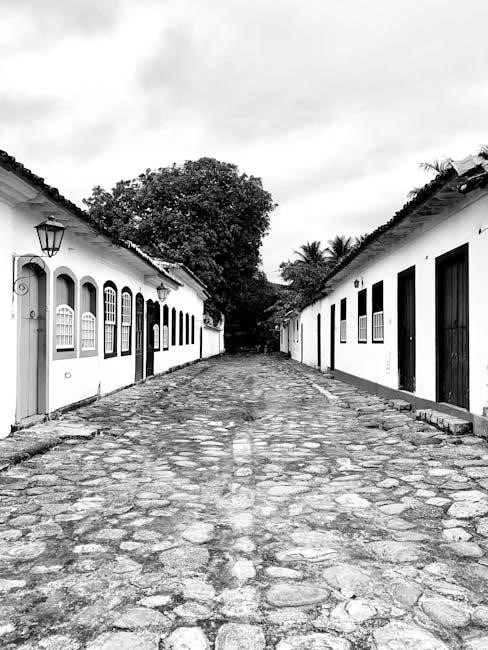
This work critically examines historical myths and misinformation perpetuated by colonial powers, exploring their origins, evolution, and modern-day implications through a lens of critical race theory and postcolonial analysis.
Overview of the Topic
The topic examines the historical and contemporary myths perpetuated by colonial powers to justify exploitation and cultural erasure. It delves into how false narratives about colonized regions, particularly Africa, were constructed and disseminated. These myths, often rooted in racial stereotypes, have been used to legitimize oppression and resource extraction. The discussion also explores the role of media and education in perpetuating these falsehoods, as well as the modern resurgence of such myths through digital disinformation. By analyzing these dynamics, the article aims to uncover the truth behind colonial myths and their enduring impact on global perceptions.

Importance of Examining Colonial Myths

Examining colonial myths is crucial for understanding the historical roots of inequality and injustice. These myths, often disguised as factual narratives, have shaped global perceptions and justified exploitation; By scrutinizing their origins and dissemination, we can uncover the deliberate distortion of histories and cultures. This analysis is vital for dismantling systemic racism and promoting a more equitable society. It also highlights the need for critical thinking and education in challenging falsehoods that perpetuate marginalization. Ultimately, this examination fosters a more informed understanding of colonialism’s lasting impact and its influence on contemporary issues.
Objectives of the Article
The primary objective of this article is to expose and dismantle the false claims and myths propagated by colonial powers. By analyzing historical records and contemporary narratives, it aims to reveal the deliberate manipulation of information used to justify exploitation. The article seeks to provide a comprehensive understanding of how these myths have endured and their impact on modern society. Furthermore, it strives to promote critical thinking and encourage a reevaluation of historical events. Ultimately, the goal is to challenge misinformation and foster a more accurate and inclusive understanding of colonialism’s legacy.

Historical Roots of Colonial Myths and Misinformation
Colonial myths originated from the manipulation of historical narratives, often rooted in the concept of the “Other,” to justify exploitation and domination, particularly in Africa.
The Concept of the “Other” in Colonial History
The concept of the “Other” in colonial history refers to the dehumanization and alienation of colonized peoples, framing them as inherently inferior and exotic. This ideological construct was deeply rooted in ancient mythologies, such as those of Greece, where the “Other” was often associated with the sacred or the unknown. During colonialism, this concept was weaponized to justify exploitation, reducing indigenous cultures to simplistic, negative stereotypes. By creating a binary opposition between the colonizer and the colonized, colonial powers legitimized their dominance, erasing the complexities of indigenous identities and histories. This myth-making laid the groundwork for systemic oppression and cultural erasure.
How Colonial Powers Used Myths to Justify Exploitation
Colonial powers employed myths to legitimize exploitation by projecting the colonized as “savage” or “backward,” necessitating “civilization” through coercion. These narratives were deeply embedded in racial ideologies, portraying Europeans as superior. Historical records show that myths about the “Other” were used to justify land seizure, resource extraction, and labor exploitation. Media and literature perpetuated these myths, framing colonialism as a moral duty. This ideological manipulation not only facilitated exploitation but also obscured the violent realities of colonialism, embedding false narratives that persisted long after independence. Such myths remain potent tools of historical distortion and ongoing inequality.
Case Studies: Myths About Africa and Their Colonial Origins
Colonial myths about Africa, such as the “Dark Continent” narrative, were crafted to justify exploitation. These myths portrayed Africa as primitive and lacking civilization, ignoring rich histories and cultures. Case studies reveal how European colonizers distorted African societies, labeling them as savage to legitimize their dominance. Such myths perpetuated stereotypes that Africa needed “civilizing,” masking the true intent of resource extraction and control. These narratives were deeply embedded in colonial literature and media, reinforcing false claims that continue to impact perceptions today.
The Role of Media in Perpetuating Colonial Myths
Western media has historically reinforced colonial myths by perpetuating biased narratives, often focusing on crises and stereotypes while ignoring Africa’s diverse cultures and histories.
Western Media’s Bias Against Africa and Africans
Western media often perpetuates negative stereotypes about Africa, focusing on crisis narratives while overlooking the continent’s diversity and progress. Structural biases in reporting reinforce colonial-era myths, portraying Africans as victims or primitives. This skewed coverage ignores historical contexts and the agency of African peoples, perpetuating misinformation. Media frameworks frequently marginalize African voices, amplifying external perspectives that distort reality. Such bias not only misinforms global audiences but also undermines efforts to challenge colonial myths and promote accurate understanding of Africa’s complex societies and histories. Addressing these biases is crucial for fostering balanced and equitable representations.
Media’s Focus on Crisis News and Negative Narratives
Western media frequently prioritizes crisis-driven narratives about Africa, amplifying stories of conflict, poverty, and instability. This selective reporting reinforces negative stereotypes, overshadowing the continent’s progress and diversity. By focusing on crises, media outlets perpetuate colonial-era myths, framing Africa as a region defined by dysfunction. Such coverage distorts public perception, ignoring historical and structural contexts that contribute to these issues. This narrow, sensationalist approach not only misinforms global audiences but also undermines efforts to challenge colonial myths and present a balanced understanding of Africa’s complex realities and resilience.
Examples of Misinformation in Popular Media
Popular media often perpetuates colonial myths through simplistic narratives, such as portrayals of Africa as a continent plagued solely by poverty and conflict. Films and news reports frequently omit historical context, reducing complex societies to stereotypes. For instance, media coverage of African nations often focuses on crises while ignoring achievements in education, technology, and cultural innovation. Such narratives reinforce outdated colonial tropes, creating a skewed perception of Africa’s diverse realities. These portrayals not only misinform global audiences but also fail to challenge or dismantle the myths rooted in colonial ideologies, perpetuating harmful stereotypes.

Modern Disinformation and Its Impact
Digital disinformation manipulates historical narratives, reinforcing colonial myths through emotional and rational manipulation, reshaping realities and perpetuating inequality in the information age.
Digital Disinformation and Its Role in Perpetuating Colonial Myths
Digital disinformation has become a powerful tool in perpetuating colonial myths, manipulating historical narratives through emotional and rational manipulation. By spreading false or distorted information, digital platforms amplify stereotypes and misconceptions about colonized regions, particularly Africa. This misinformation often reinforces harmful stereotypes, such as portrayals of Africa as inherently violent or backward. Social media algorithms exacerbate this issue by prioritizing sensational content, creating echo chambers that solidify these myths. The persistence of colonial logics in digital spaces underscores the need to critically examine and challenge these narratives to dismantle their enduring impact on global perceptions and policies.
Psychological and Social Factors Aiding Disinformation
Psychological factors such as ignorance, inferiority complexes tied to neo-colonialism, and emotional manipulation fuel the spread of disinformation. Social dynamics, including group identity and confirmation bias, further entrench these falsehoods. Digital spaces amplify such tendencies, as individuals often engage with content that reinforces their preexisting beliefs. Emotional narratives, blending truth and fiction, are particularly effective in distorting reality. These psychological and social factors create fertile ground for misinformation to thrive, perpetuating colonial myths and undermining efforts to challenge harmful stereotypes and historical inaccuracies. Addressing these factors is crucial to combating disinformation effectively.
Contemporary Narratives About the Information Society
Contemporary narratives about the information society often overlook the persistent colonial logics embedded within digital discourses. Critical race theory and decolonial perspectives reveal how these narratives perpetuate historical inequalities. The information colonial hypothesis highlights technology’s role in marginalization, while manipulated information blurs fact and fiction. Digital worlds reflect power dynamics, challenging hegemonic regimes like settler colonialism. Counter-narratives aim to disrupt these embedded colonialities, advocating for pluriversality and border thinking. By interrogating these discourses, scholars seek to construct alternative narratives that acknowledge and dismantle the colonial myths embedded in modern information systems and digital cultures.
Debunking Myths and Promoting Truth
Narratives play a crucial role in disrupting colonial myths, as highlighted in Sue Gollifer’s work, emphasizing education and counter-narratives to challenge false historical claims and promote accuracy.
Efforts to Disrupt Colonial Myths Through Narratives
Narratives play a vital role in challenging colonial myths, as seen in works like Sue Gollifer’s, which highlight the educative power of stories to disrupt false claims. By centering voices from the Global South, these efforts dismantle stereotypes and reclaim histories. Counter-narratives, grounded in critical race theory, provide alternative perspectives, exposing the colonial logics embedded in dominant discourses. Education and storytelling are key tools in this process, empowering communities to question and refute misleading historical accounts. Such initiatives foster a more inclusive understanding of the past, promoting truth and combating misinformation effectively;

Counter-Narratives and Critical Race Theory
Counter-narratives rooted in critical race theory challenge colonial myths by centering marginalized voices and exposing systemic racial inequalities. These narratives disrupt dominant Eurocentric discourses, offering alternative perspectives on history and power. By interrogating colonial logics, they reveal how misinformation has been used to justify exploitation. Critical race theory provides a framework to analyze these dynamics, emphasizing the need to dismantle structures that perpetuate inequality. Such counter-narratives are essential in decolonizing knowledge and fostering a more equitable understanding of the past and its impact on contemporary societies.
Role of Education in Combating Misinformation
Education plays a pivotal role in combating misinformation by fostering critical thinking and media literacy. It equips individuals with the tools to analyze and deconstruct false narratives, particularly those rooted in colonial myths. By incorporating diverse perspectives and histories, education challenges stereotypes and promotes empathy. Critical race theory further enhances this by highlighting systemic inequalities and encouraging nuanced understandings of power dynamics. Educators must prioritize historical contextualization and encourage questioning of dominant narratives. This empowers students to discern truth from falsehood, fostering an informed and inclusive society capable of dismantling colonial myths and their modern-day manifestations.
The conclusion underscores the importance of critical thinking and historical contextualization in debunking colonial myths. Education and critical race theory are essential in dismantling false narratives and fostering an informed society capable of combating misinformation effectively;
The analysis reveals how colonial myths and misinformation have historically justified exploitation, often perpetuated by biased media and institutionalized narratives. Modern disinformation, fueled by digital platforms, continues to distort truths, reinforcing racial and social inequalities. Critical race theory and decolonial perspectives offer frameworks to challenge these myths, emphasizing the need for education and counter-narratives to dismantle colonial legacies. By interrogating historical and contemporary discourses, this work advocates for a more informed and equitable understanding of colonialism’s enduring impact.

Importance of Critical Thinking in Understanding History
Critical thinking is essential for uncovering the truths obscured by colonial myths and misinformation. By questioning dominant narratives and analyzing historical sources, individuals can identify biases and power dynamics that shaped colonial discourses. This approach fosters a deeper understanding of how myths were weaponized to justify exploitation and inequality. Cultivating critical thinking enables individuals to challenge false claims and recognize the resilience of marginalized voices, ultimately promoting a more accurate and inclusive interpretation of history.